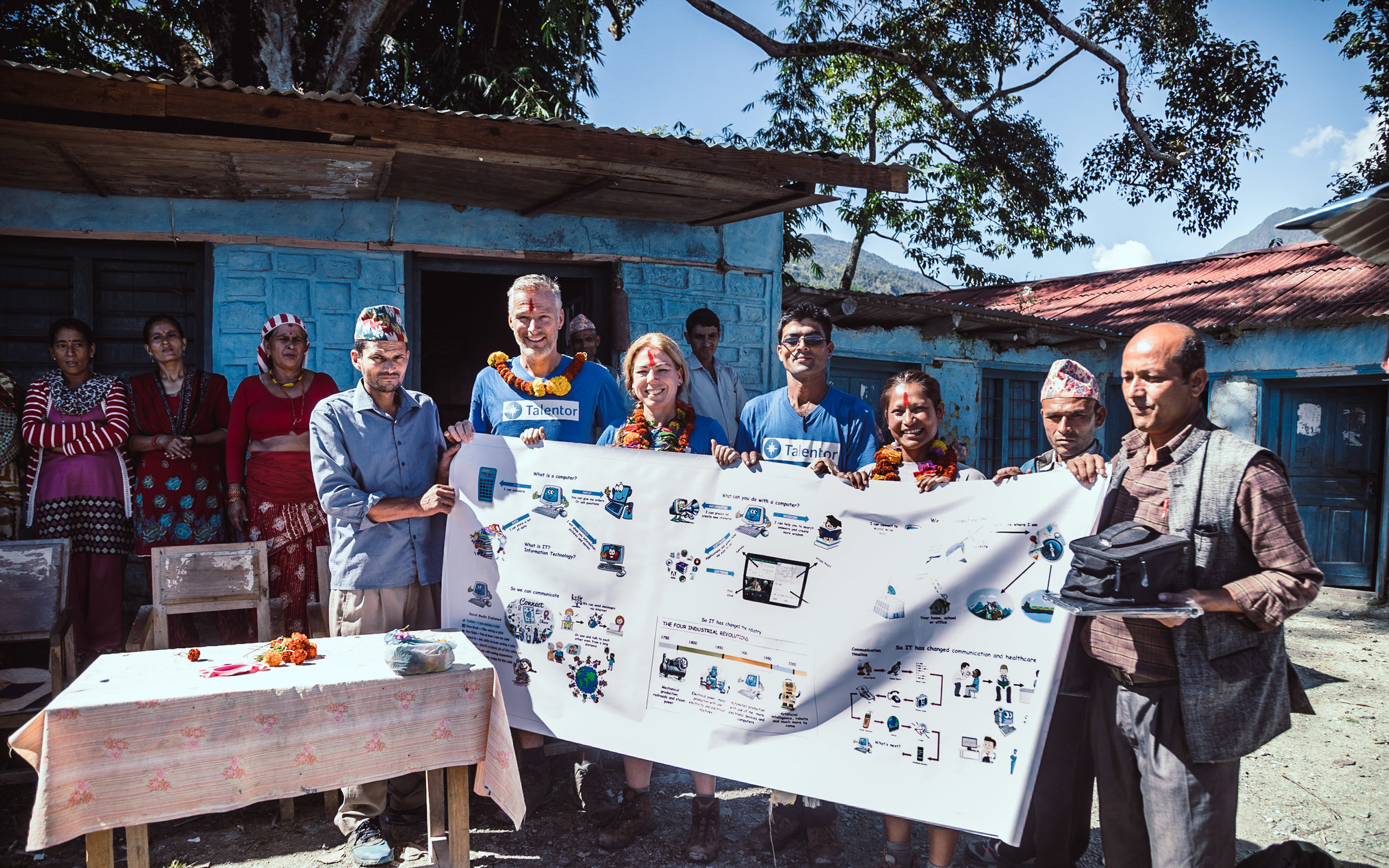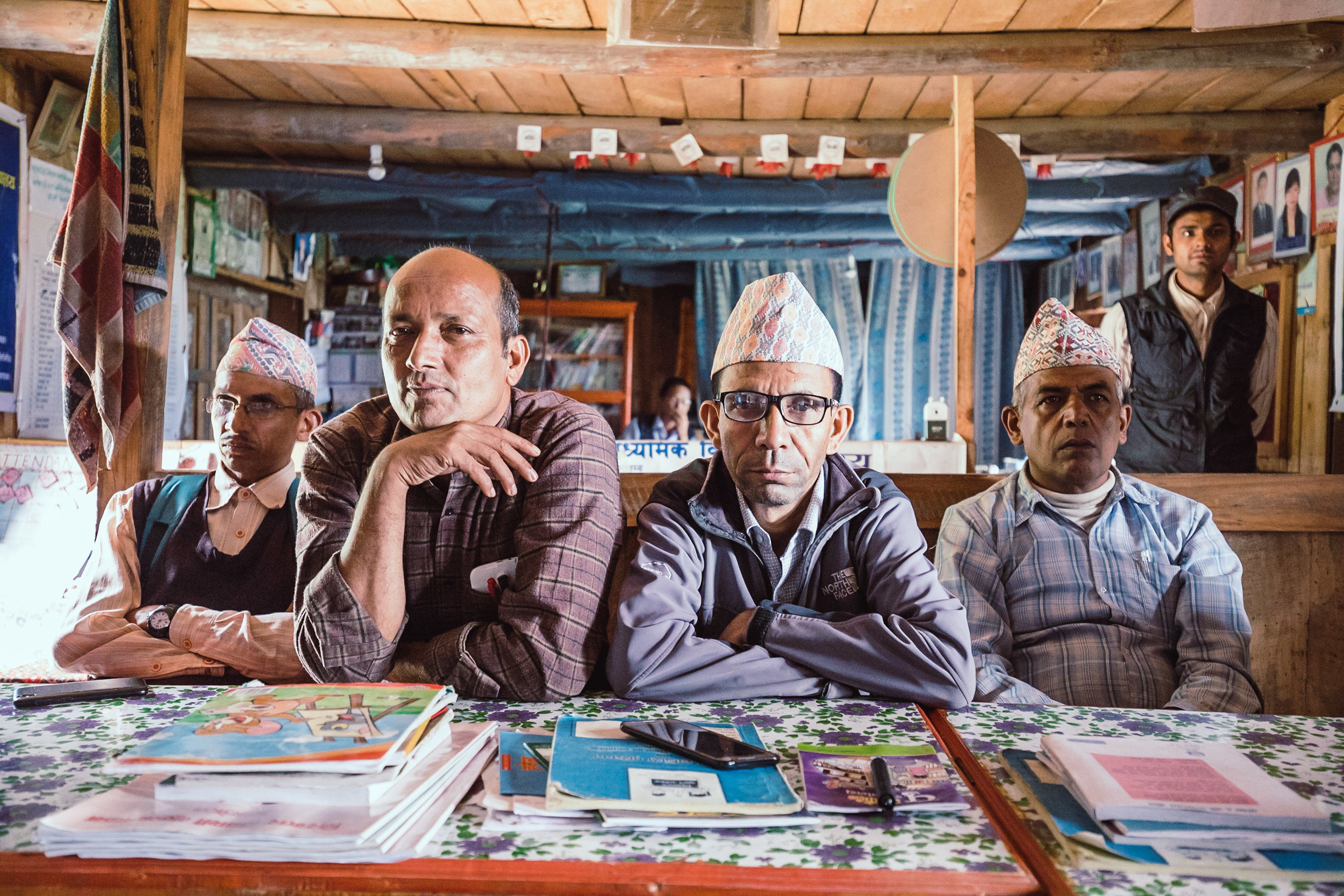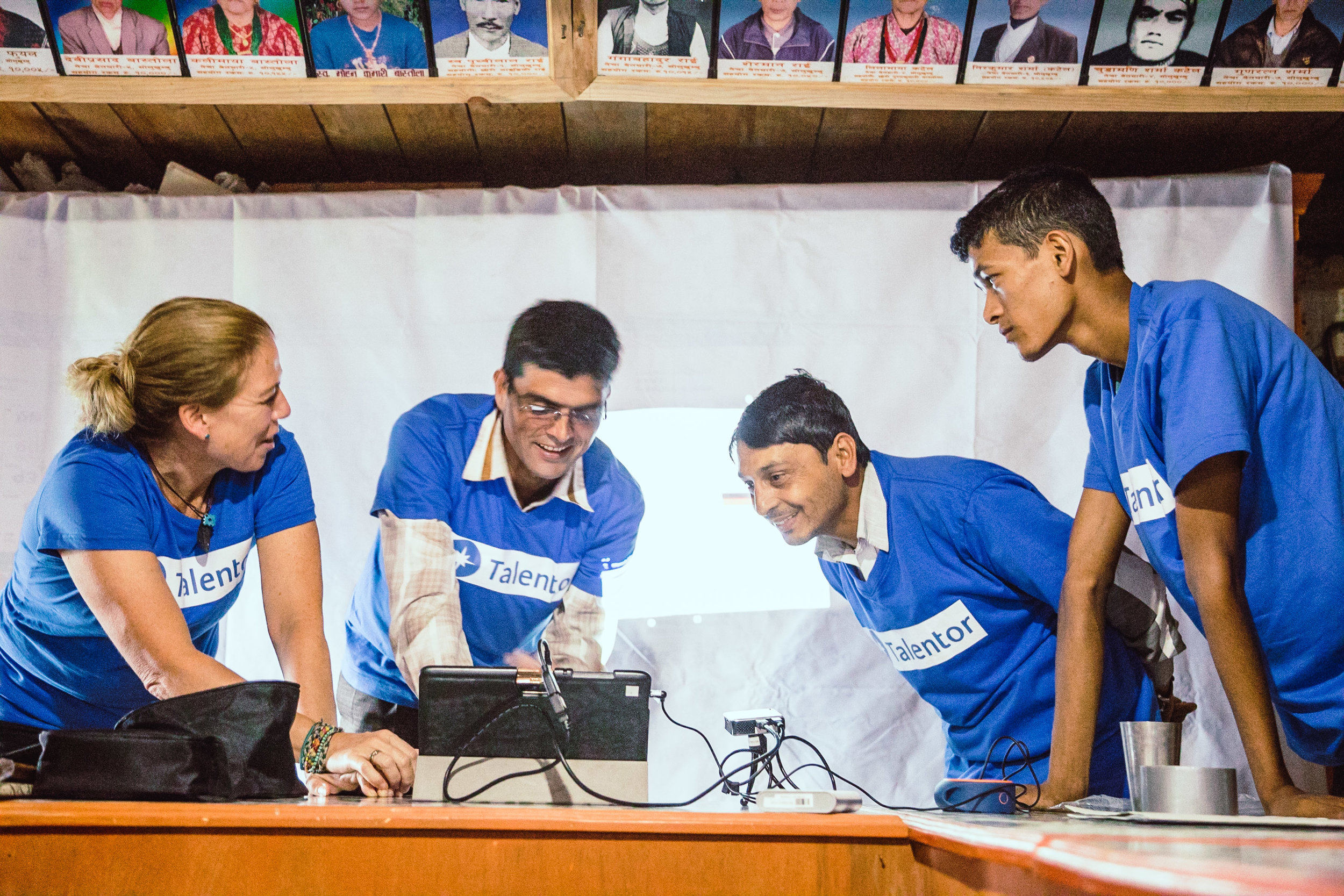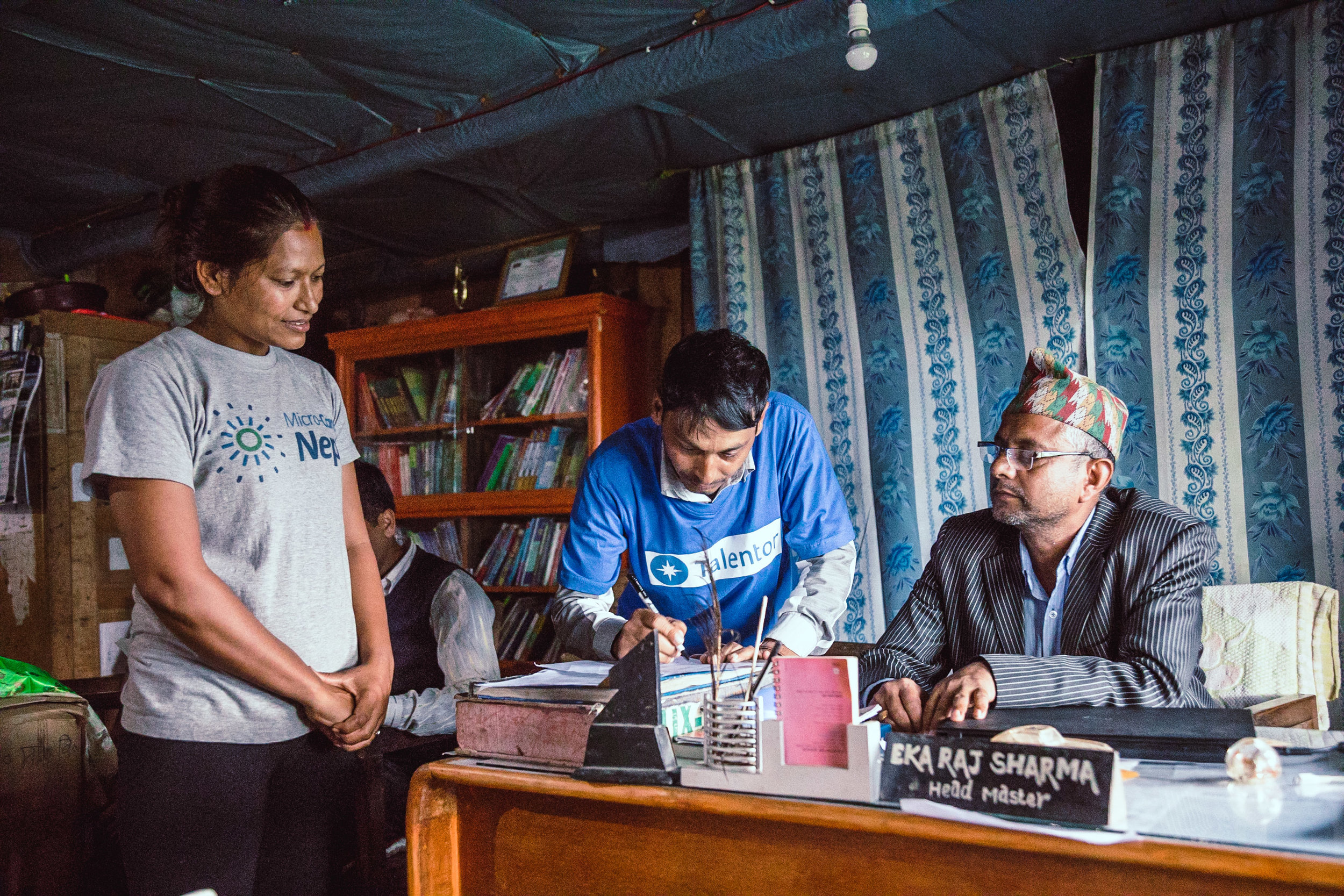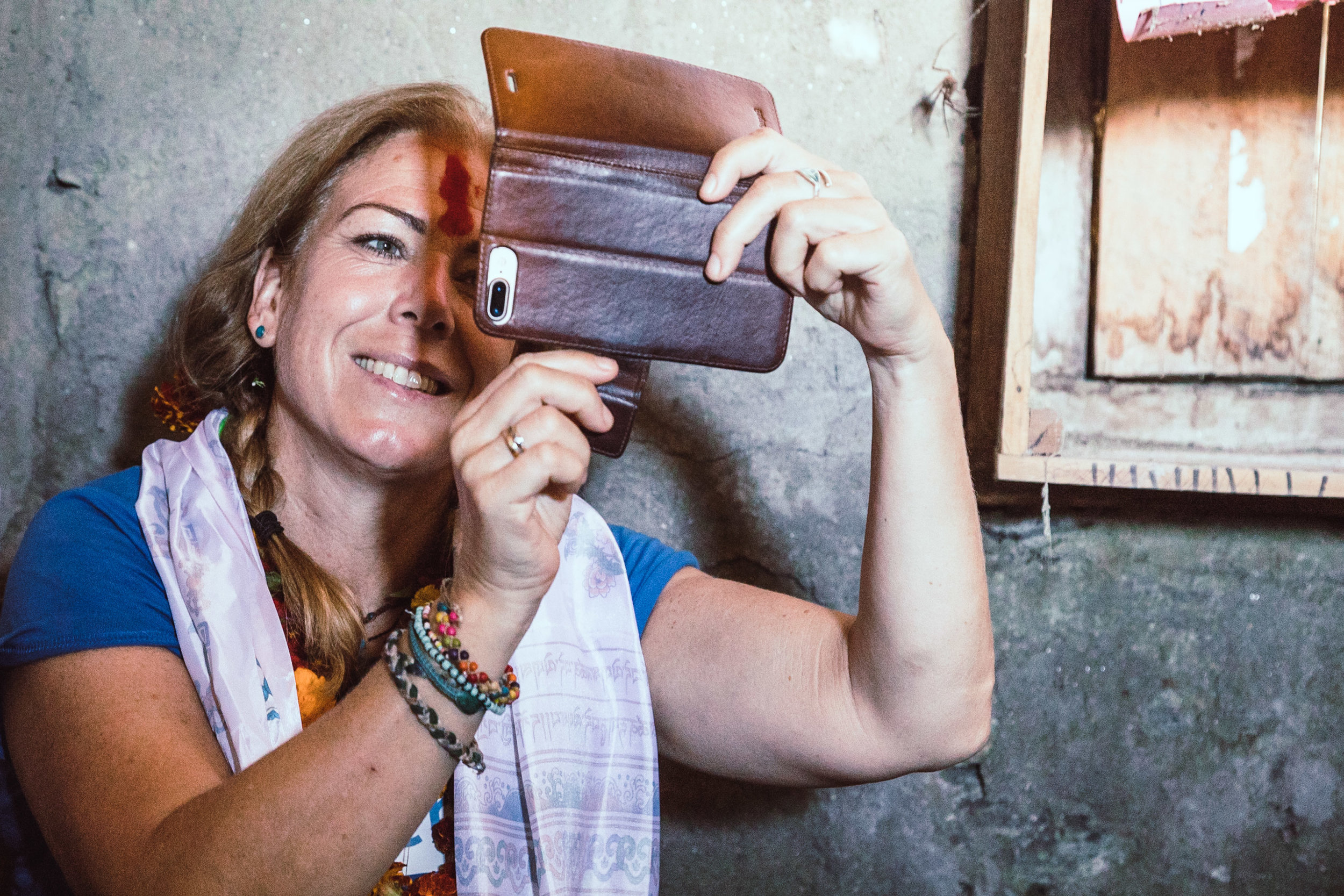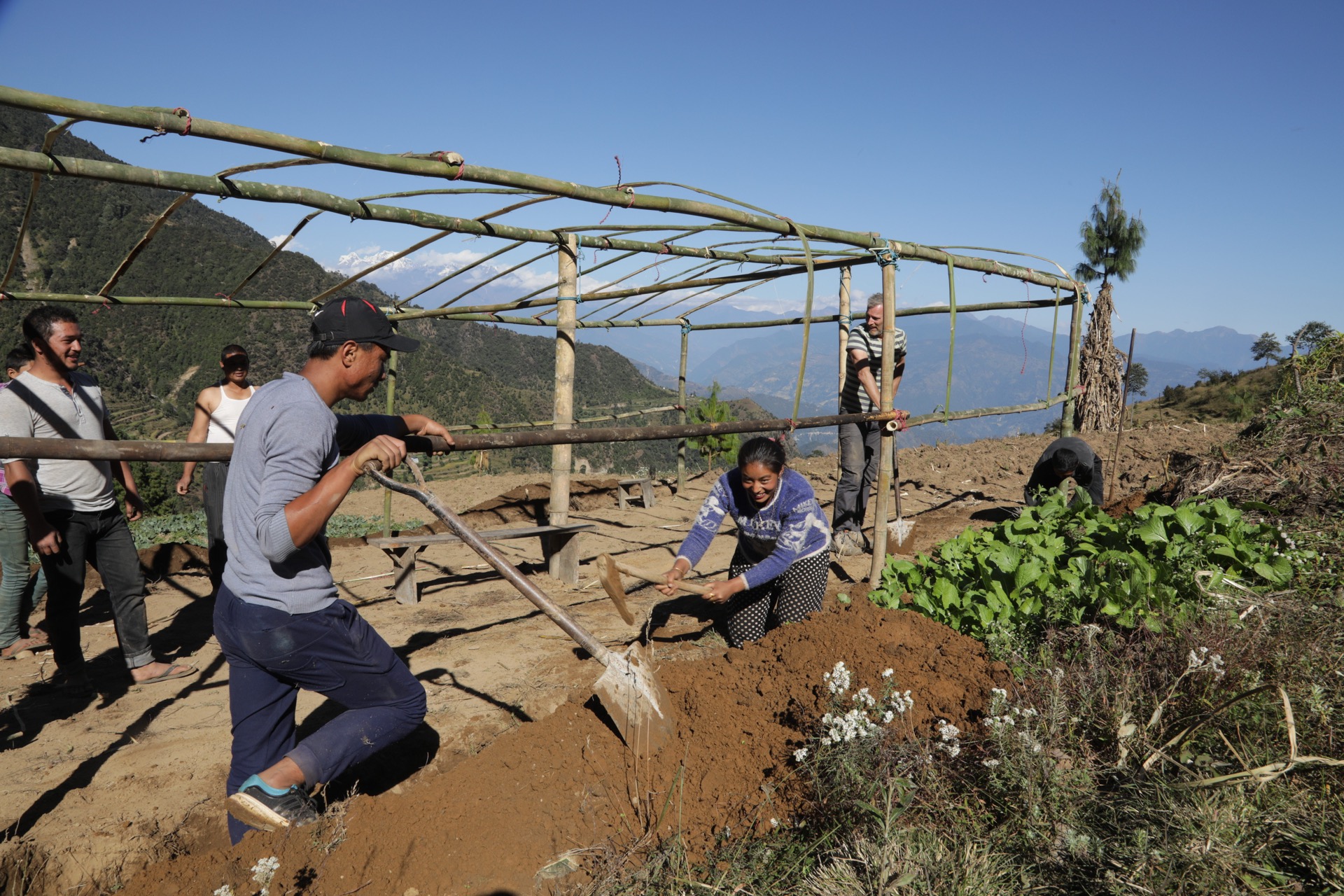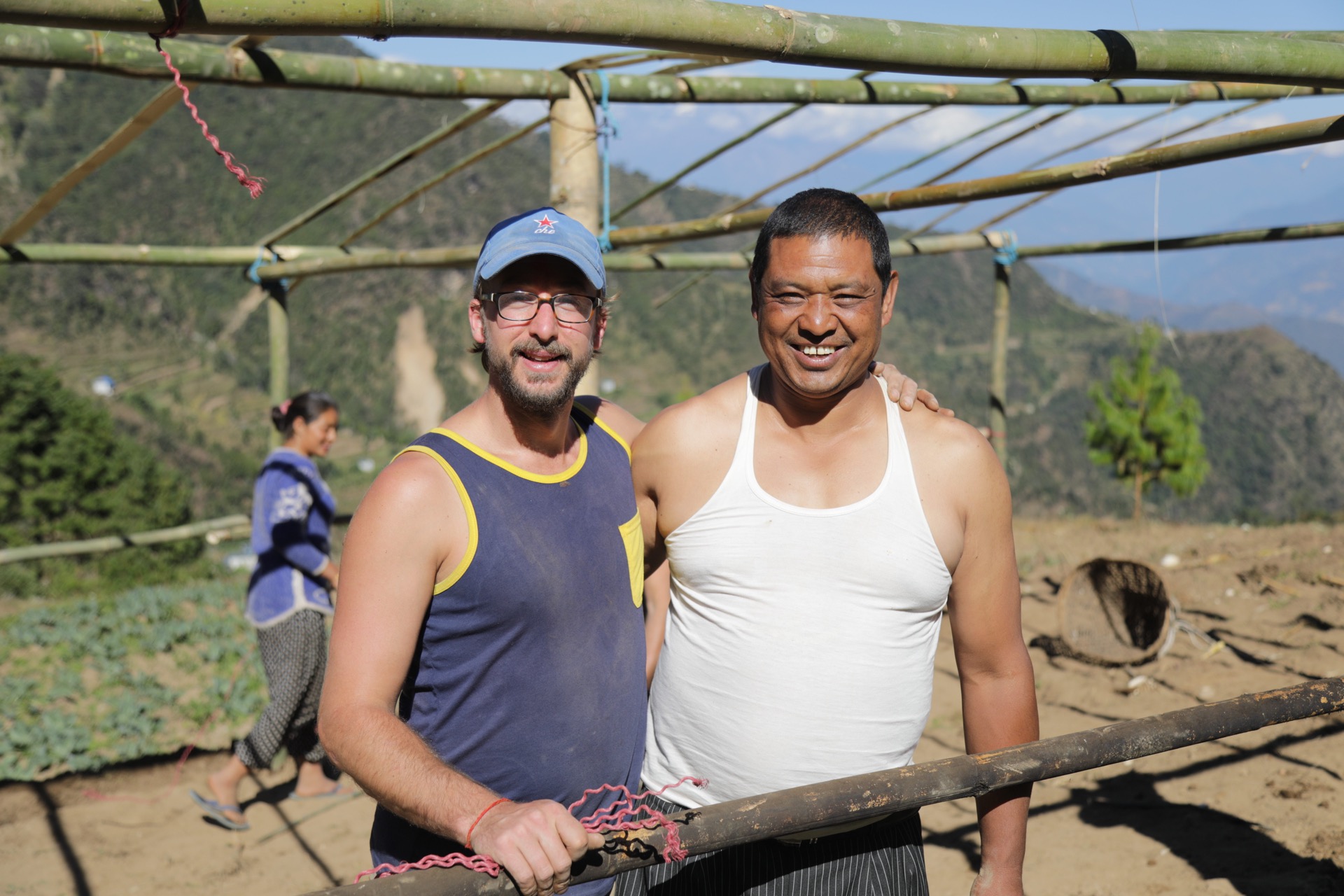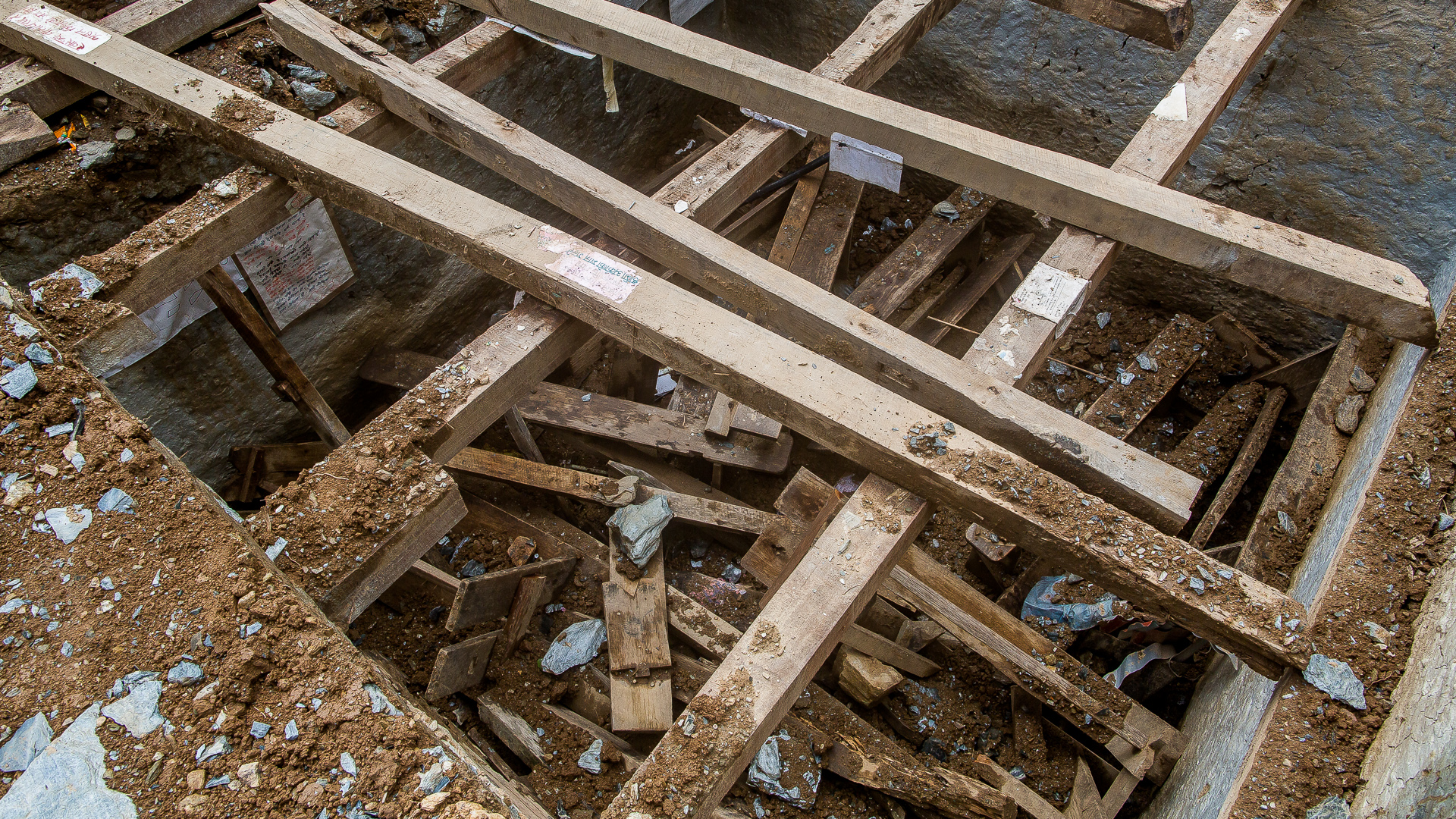In April 2019 we went to the village of Solagar in Okhaldunga district. Here we donated school material to the small local school and also had the chance to review the two greenhouse we established here already 3 years ago. We where happy to see that the greenhouse of this Tamang family was still used very well.
Projector and Laptop for the Shree Kalika Primary School in Solagar
Project : Education Material and I.T. for Education
In April 2019 we went to the village of Solagar in Okhaldunga district. Here we donated school material to the small local school. Especially the I.T. material containing one laptop and one projector where received with great pleasure by the school teachers.
The new school complex on the land that was given by one of the community members.
Handing over the projector and laptop to the head of the school.
After handing over, with all the children and Samjhana
With all the children and now including Pim.
School posters, pencils and balls for the primary school in the little village of Thulodunga. From this time we decided to support the school as the old principal of the school in Solagar, that we respected very much for his efforts, got transferred to the school in Thulodunga.
The school complex of the village Solagar in Okhaldunga district.
Greenhouse Review in Deorali, Okhaldunga - March 2019
While returning back to Okhaldunga and Solu district we had the opportunity to to the 3de year review of some of the greenhouses we initiated.
Below one of the two greenhouses of Deorali in Okhaldunga district.
Greenhouse Review in Goiry, Okhaldunga - March 2019
While returning back to Okhaldunga and Solu district we had the opportunity to to the 3de year review of some of the greenhouses we initiated.
Below the greenhouse that had many metamorfoses and had to be rebuild many time because of storm winds. The great thing about the family managing the greenhouse is that every time they restore it very nicely and keep making the best use of the greenhouse plastics and seeds provided.
Medical Case - Rom Kumari Basnet (55) Sunlan
Rom Kumari. They took away some possible bad tissue that created a big swelling on her back.
Medical Case - Sanjiv Niraula (12) Sunlan Solu
Sanjiv is 12 years old and lives in the village Sunlan in Solu district. He had eye pain and irritation for 2 years and his eyesight was decreasing. After consulting with the eye doctors of the specialized Tilganga eye hospital the conclusion was the problems where caused by a allergy and had to be treated with antibiotics as it had infected the eyes as well. After the infection was over he had to wear a glass with a specific non power glass to protect his eyes more. Also he got drops to keep the flier level of his eyes up to level and avoid the irritations to start. We gave him this last mentioned medicine for a whole year and gave all instructions together with the pharmacist.
Medical Case: Yauna Niraula from Sunlan SoluKhumbu
Medical Case: Sugam Niraula (5) Sunlan
5 New Health Cases from Sunlan, Solu
On our way back from Solu district we could take 5 persons with health issues. They all neded checkup in Kathmandu hospital. One childs father had to join to take care of his little son. We could arrange a jeep to go all together to kathmandu where they stayed in a simple Nepalese hotel. The group consisted of: Naura
Yauna Niraula - 10 years
7 years of eye problems and did 2 years ago checkup but without improvement. She had a burning pain in her eyes mostly left and also her sight on the left eye was affected.
Sanjiv Niraula - 12 years
2 years of eye problems. He had also a burning pain in his eyes that where most of the time red and his sights wasn’t good.
Indra Prasad Niraula - 47 years
Father of Yauna Niraula and had a eye sight problems and because of this had frequently head pain. He had checkup on his sight and needed a glass.
Rom Kumari Basnet (45)
Rom Kumari has a swelling on the back of her shoulder, feels weak and sometimes sick. She is very worried as most of the villagers tell her this must be cancer.
Sugam Niraula (5)
The little boy Sugan his two fingers are attached since birth. “He likes to have a hand like other children” as he describes in his own words to us. We consulted with the hospital and we where informed this was only possible in Kathmandu.
I.T. PROJECT - in Solu district, East Nepal
Door vrijwilligers en donateurs: Petra en Gert Groenewoud
Na in 2016 met Micro-Care Nepal op reis te zijn geweest besloten Petra en ik om dit jaar samen te gaan. 22 jaar na onze huwelijksreis weer samen naar Nepal!
Met de ervaring uit 2016 in geheugen besloten we in overleg met Pim en Samjhana van Micro-Care Nepal om dit jaar te gaan voor een grotere uitdaging. Namelijk de scholen voorzien van een IT lesomgeving en dat zelfs zonder de beschikbaarheid van electriciteit en internet. Er kan slechts via een klein zonnepaneeltje een powerbank opgeladen worden.
Gert again amazed by the destructions that the 2015 earthquakes created and the fact that many of the destructed buildings still couldn't be repaired or rebuild.
Er is in de Nepalse buitengebieden dus weinig bekend over IT en zijn de ontwikkelingen hierin achtergebleven. Wellicht om deze reden dat de interesse en nieuwsgierigheid er zeer zeker wel is.
Ons doel was een IT lespakket te samenstellen waarmee nieuw lesmateriaal voor verschillende vakken gepresenteerd kan worden. Gezien het gebrek aan volstroom hebben we na onderzoek besloten dat alle materialen met USB opgeladen dienen te worden. Het pakket bestaat uit: een tablet, een mini beamer, een powerbank, een speaker en natuurlijk de benodigde kabels. Het project moet een duurzaam karakter hebben en zo het onderwijs op de lange termijn blijven voeden.
Morning assembly atone of our supported schools in the Solu district in East Nepal.
Met hulp van vele donateurs hebben we veel geld ingezameld om deze pakketten aan te schaffen. We willen daarom in het het bijzonder onze dank uitbrengen aan: DPA, Sigmax en Talentor, welke onze hoofdsponsoren waren. De kleinere sponsoren en donateurs zijn wij natuurlijk net zo dankbaar!
The teacher training given by Petra Groenewoud supported by the translations of Samjhana Bishankhe.
Petra heeft zich vervolgens vol gestort op het samenstellen van een lesprogramma voor de "IT teachers", zij moeten het gaan leren en zij moeten gaan lesgeven. Daarnaast de tablets voorzien van veel content, zoals veel educatieve filmpjes, offline educatieve games, een offline Wikipedia en offline kaarten.
The IT poster of this project explains all about IT and what we can achieve with it.
Non IT teachers listening and looking carefully to the story about the great amount of possibilities that the projector can bring for teachers and students.
Na de voorbereidingen was het eindelijk zo ver en gingen we op reis naar het prachtige heuvellandschap van het SoluKhumbu district. Het is een onvergetelijke reis en ervaring geworden. We hebben 5 schooltjes variërend van 150 - 750 leerlingen voorzien van het IT materiaal. We hebben dagenlang lesgegeven en de leraren zelf laten oefenen en onze eerste conclusie is dat het enorm is aangeslagen. Het enthousiasme is groot, de teachers zijn zeer geïnteresseerd en de leerlingen..... Ja, daar wordt je stil en ook emotioneel van. Open monden en ogen die er bijna uitvielen. Voor velen een eerste ervaring met een computer of zelfs een bewegend beeld. Fantastisch om dit te mogen doen, dit resultaat weegt absoluut op tegen de vele uren voorbereiding.
Voor deze scholen is het zeer innovatief en ze beseffen dat ze nu echt voorlopen en verder kunnen met deze aanvullende manier van lesgeven.
Happy faces from the IT teachers as they have passed the user test after Petra gave the teacher training. On the teachers our main sponsor, the company " Talentor ".
IT teacher taking his practical 'exam' before we handover our IT material officially to the school.
Surprised and curious to see the projectors presentations on the wall.
We zijn ontzettend blij en trots dat we dit samen met Micro-Care Nepal hebben kunnen bereiken. Wij willen Pim en Samjhana bedanken voor de kans om dit te mogen doen en we ons gezamenlijk inzetten om dit project ook in de toekomst voort te kunnen blijven zetten. Maar hier hebben natuurlijk ook van jou hulp bij nodig. Doneer nu op dit IT project en zorg dat we op nog meer scholen het onderwijs kunnen verbeteren.
The Micro-Care Nepal user agreement and contract signed by the headmaster and IT teacher of each school.
Handover of the IT material including a tablet, speaker and projector.
Petra enjoying the sight of the curious and smiling faces of the children.
Surprised and curious to see the projectors presentations on the wall.
We willen onze donateurs en sponsoren, zakelijk en privé, bedanken want zonder de financiële middelen was het niet mogelijk geweest. Heel veel dank.
Wij raden iedereen aan die al lang twijfelt om iets bijzonders te doen, ga mee met Micro-Care Nepal en je zult deze ervaring nooit vergeten🙏🍀
NAMASTE
VRIJWILLIGER Gert Groenewoud, OVER ZIJN ervaringen met MICRO-CARE NEPAL
Written by: Gert Groenewoud
Educatie materialen & kleding voor scholen in Gorka en Solu-Khumbu district.
Over the past few years it has become very clear to me that I wanted to give something back to the world, but I was not sure what this could be.
The earthquakes of 2015 hit me…To see small villages being completely destroyed, infrastructure destroyed, seeing people dying, amongst them children, made me want to do something. For me, this was the moment I realized that I wanted to help Nepal, but I was not sure how.
Let me introduce myself to you. My name is Gert Groenewoud. I am 50 years of age, married to Petra and have 2 children, Jesse and Zoe. I remembered Nepal from the time I spent there on my honeymoon some years ago as being a beautiful and welcoming country. The people were always smiling even when they hardly had anything. A friend introduced me to Micro-Care Nepal. After meeting Pim (Founder of Micro-Care Nepal) it was even more clear that I could really do something for Nepal.
Micro-Care Nepal stands for small projects in the most remote places of Nepal. In all their projects they work closely together with local people.What makes me want to start projects with Micro-Care Nepal is that they really improve the people’s lives. And in a sustainable way. The projects focus on the poorest in small remote mountain villages. Micro-Care Nepal is different because they teach people how to manage the projects themselves. On the website www.microcarenepal.org you can find a choice of all types of donations for the projects.
All of them are very deliberate and personal. And these days more important; you will be able to see what we do with your donations. You will receive newsletters with stories and photos of the families we help with your donations. Also want to stay informed about our initiatives? Subscribe on microcarenepal.org for the newsletter.
My personal motivation? The healthier and happier people I see, the better. I hope with this message I have given you something to think about. If so, please make a donation because Nepal needs it!
Thank you for your support,
Gert, Groenewoud
Februari 2017
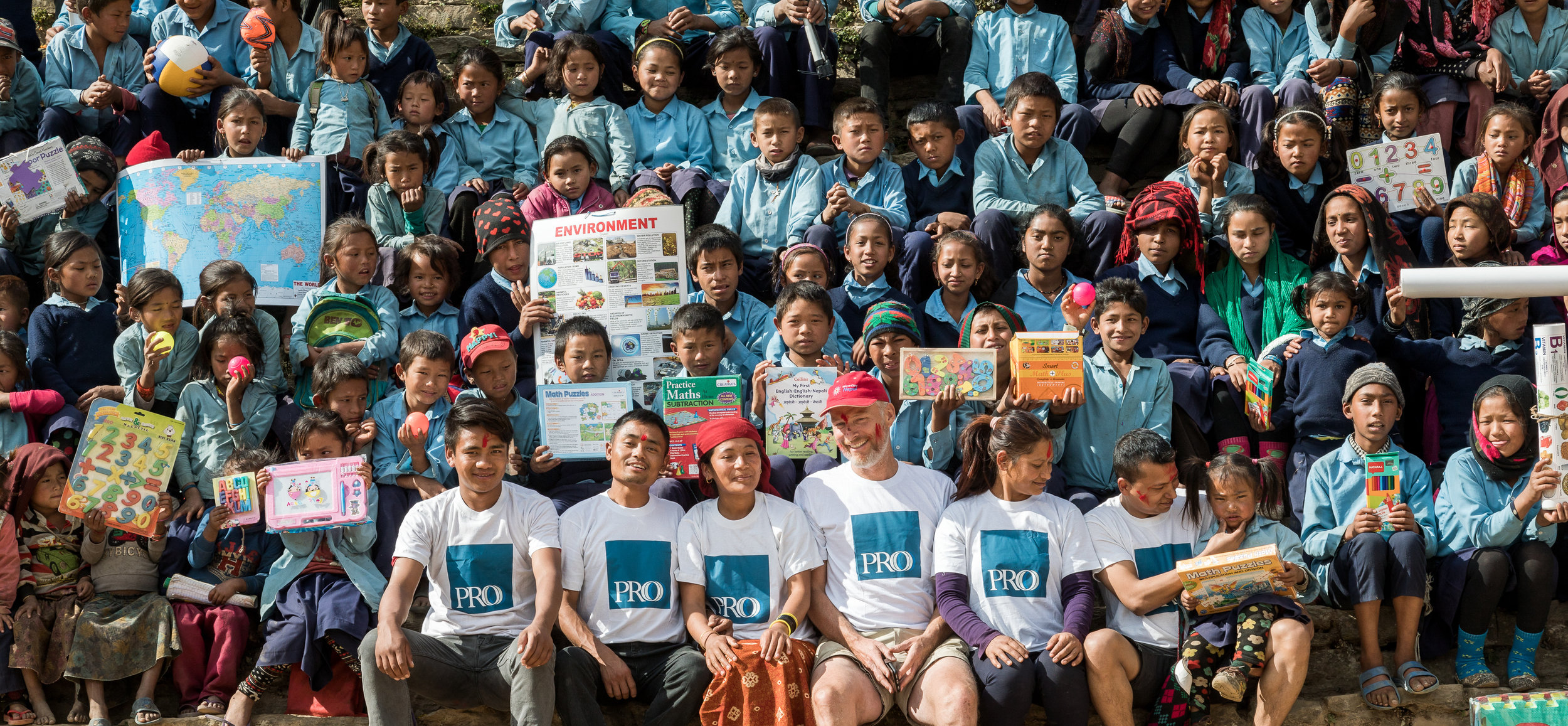
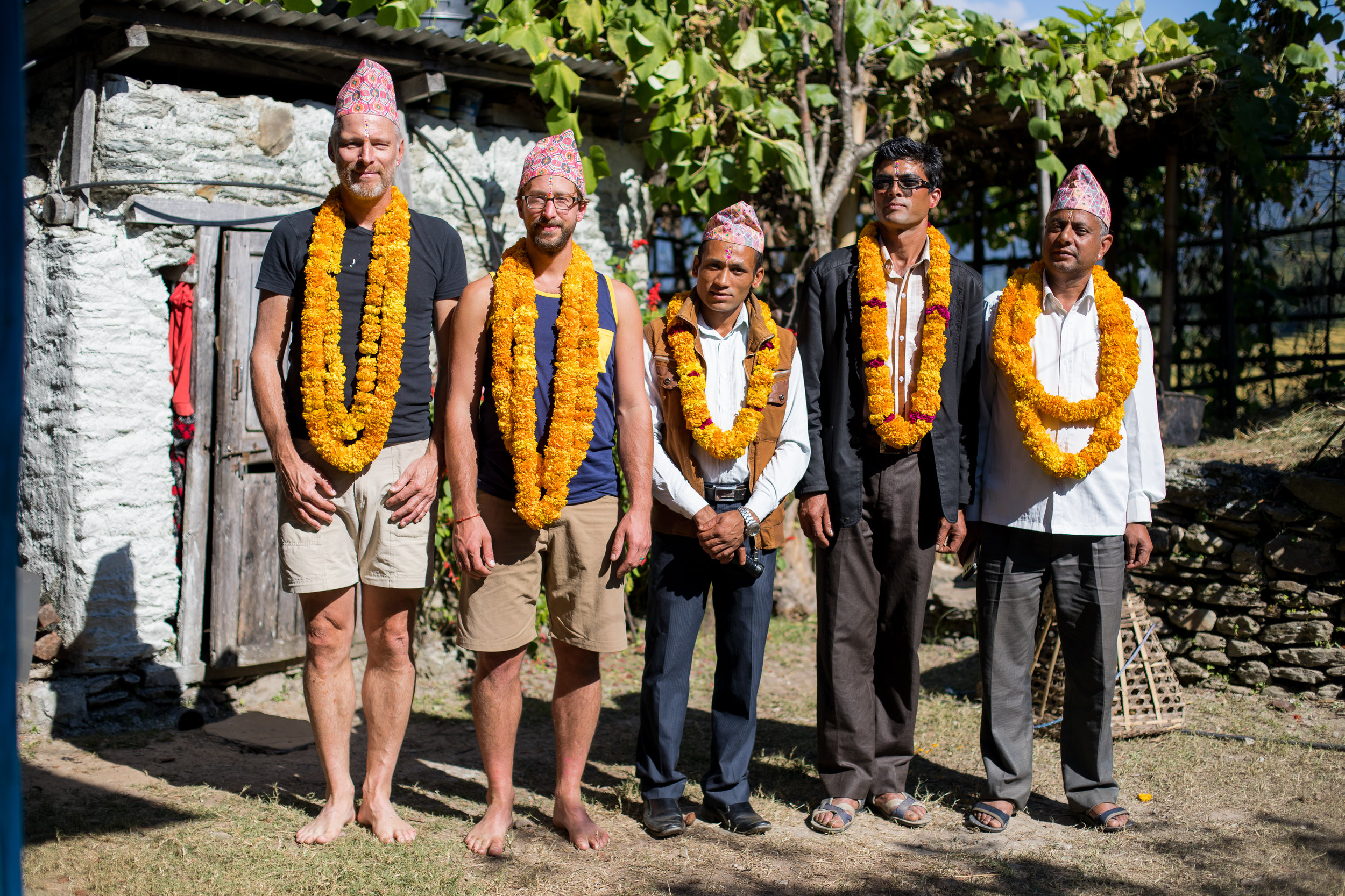
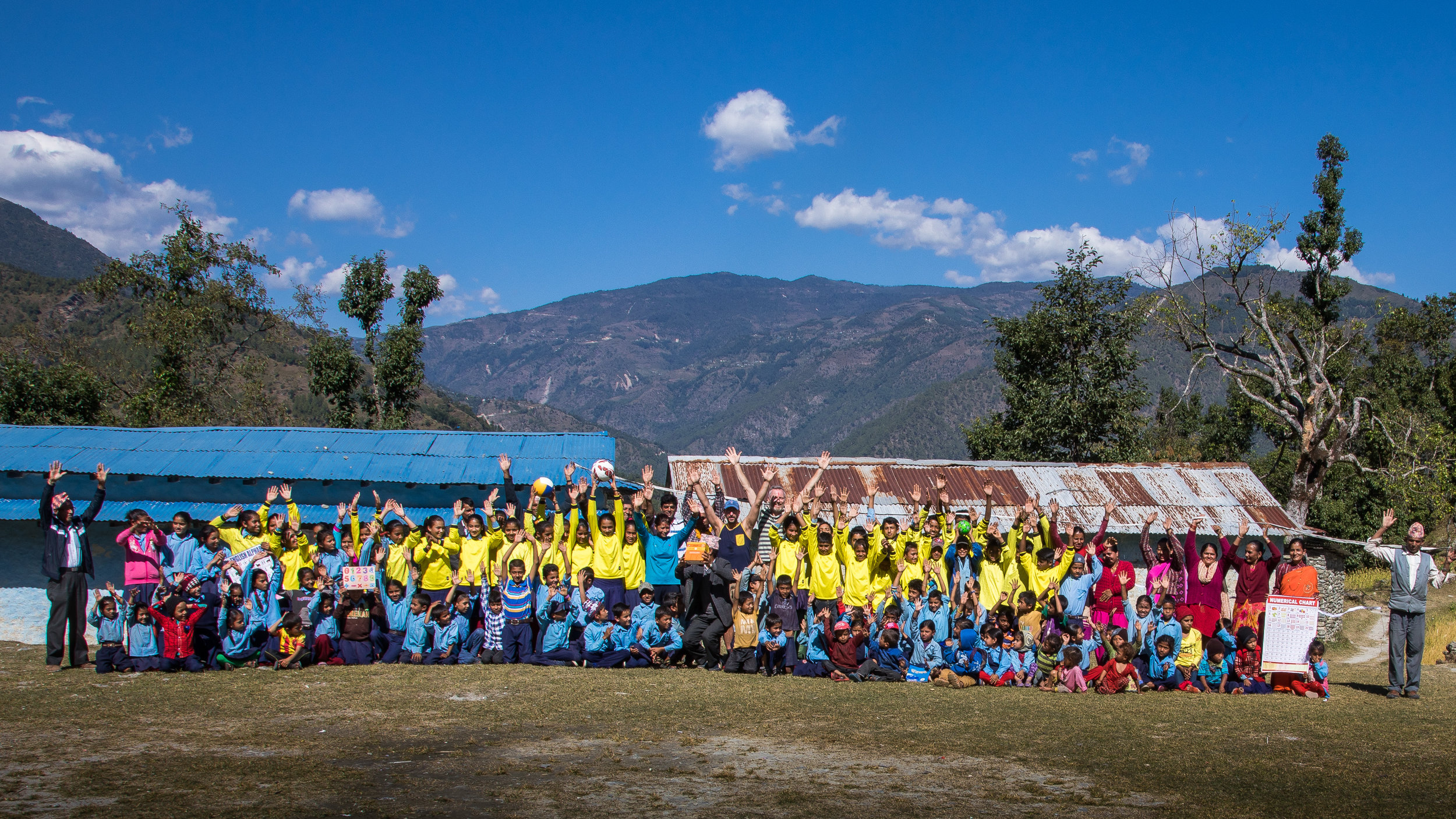
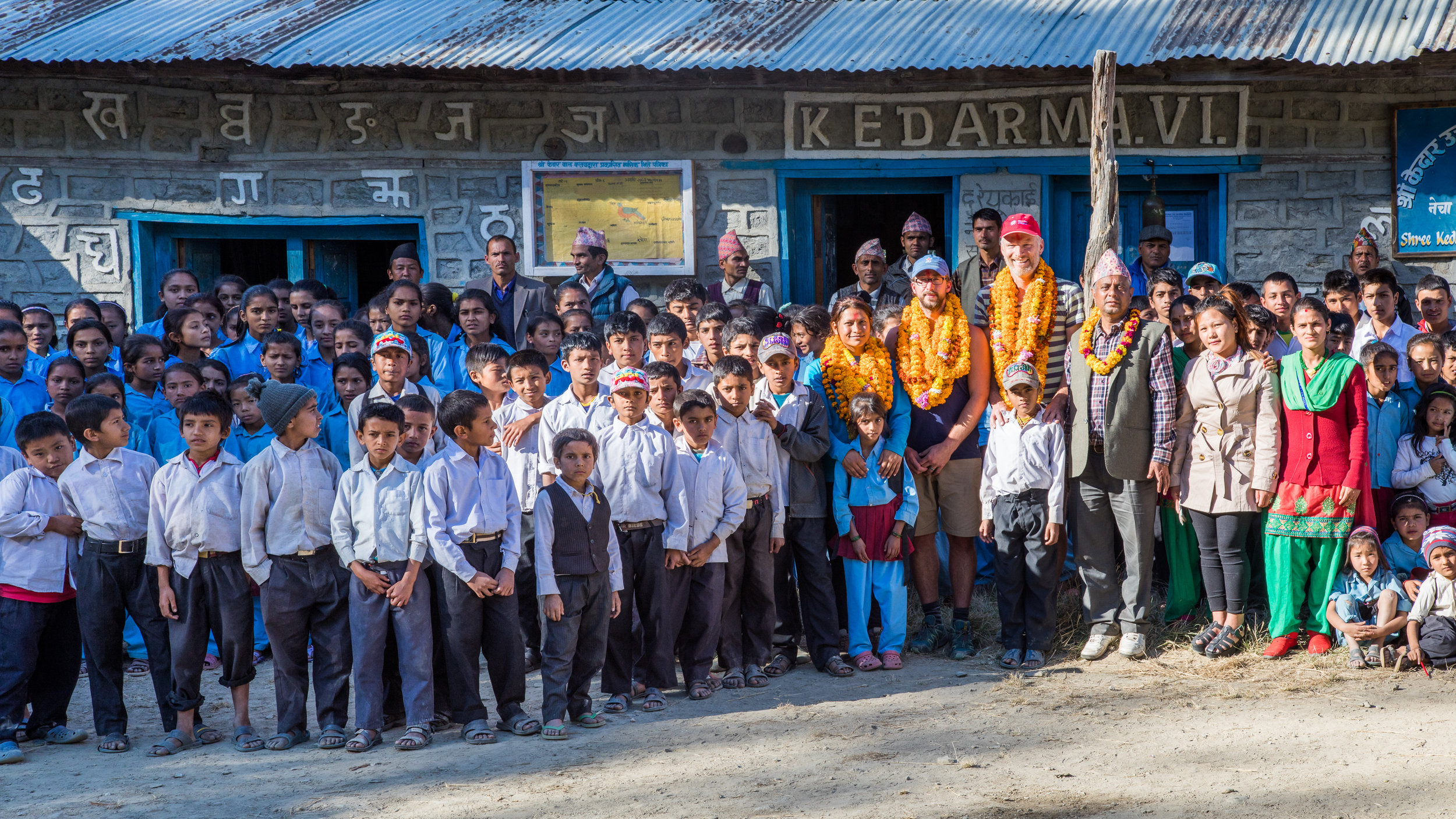
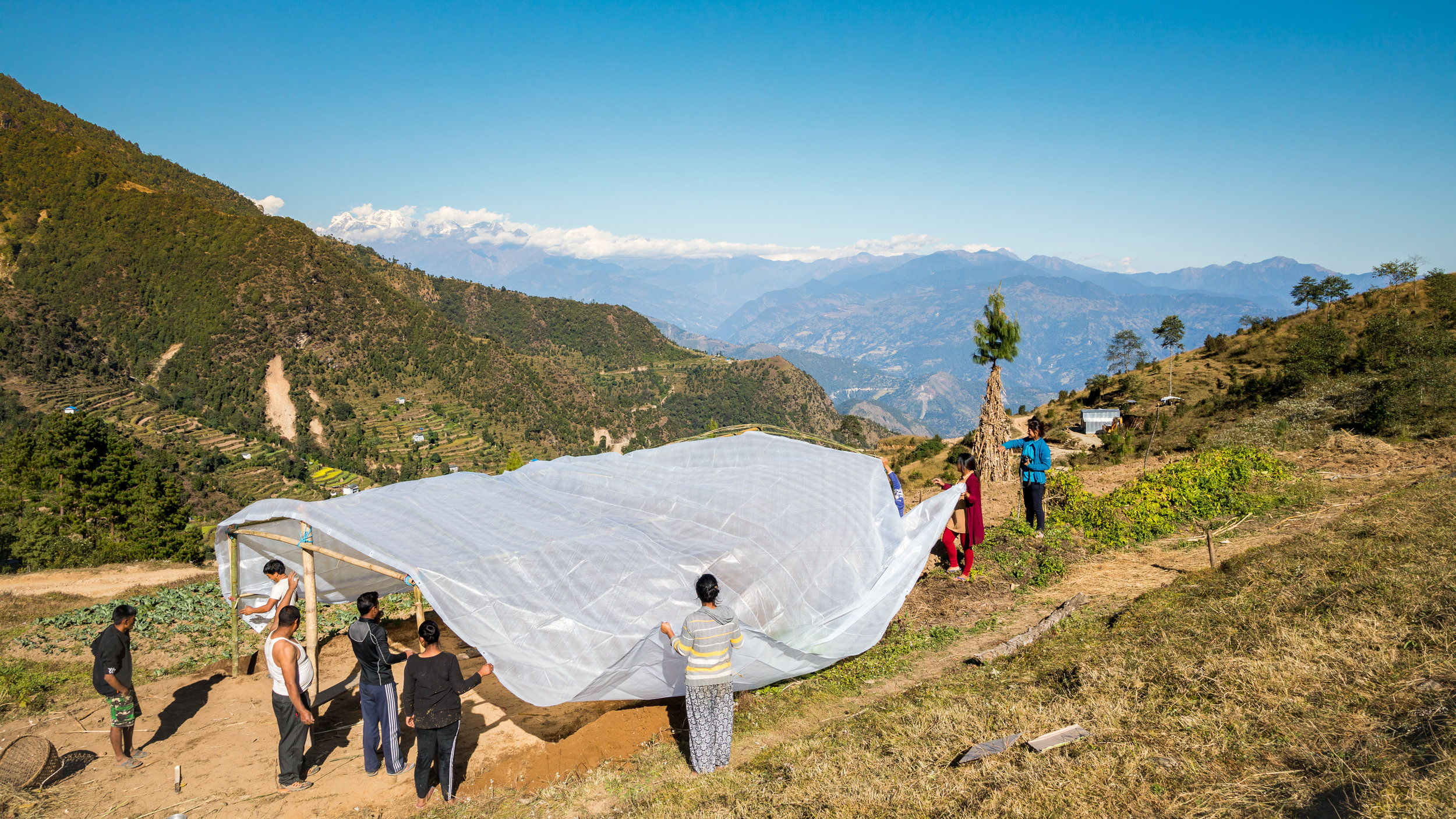
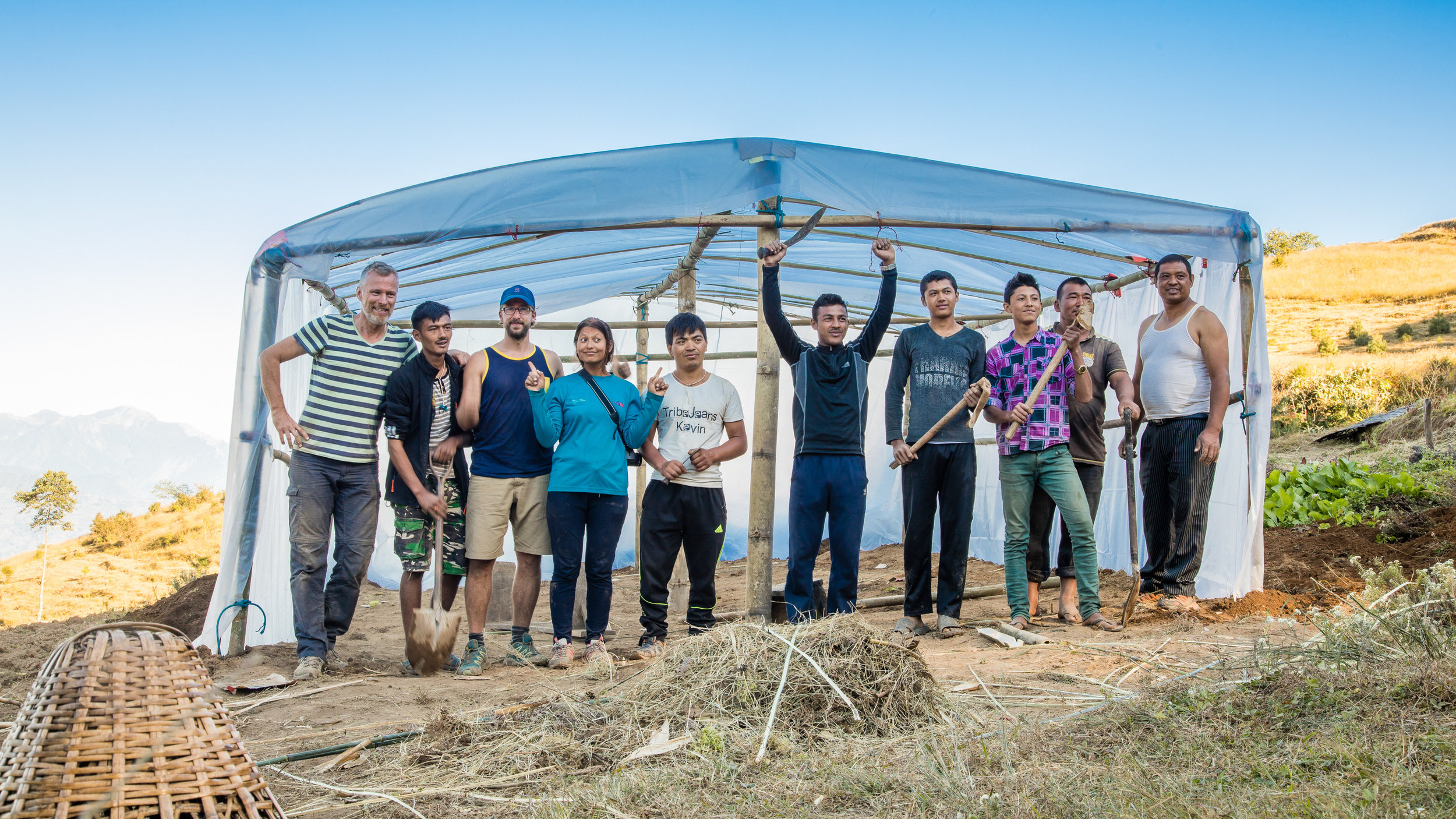
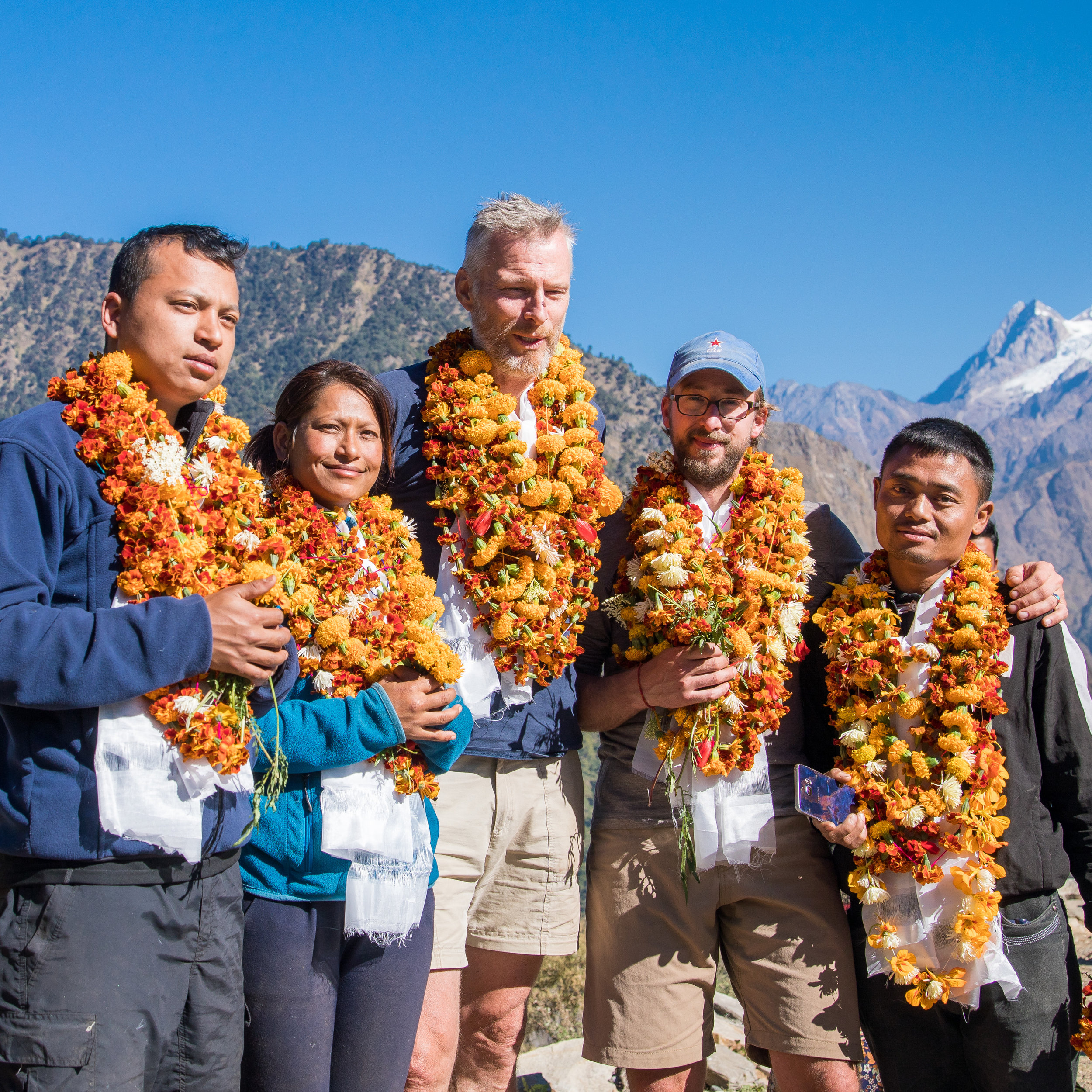
Micro-Care Nepal continues projects in SoluKhumbu district
5 November 2016
After finishing the greenhouse with the teachers of the school in Goiri.
Text by Pim Horvers:
The first week of work back in Nepal is finished. Together with volunteer Gert Groenewoud we donated school materials to 6 schools in SoluKhumbu district.
- We visited two dalit communities to handover clothing.
- We donated a greenhouse to a small undeveloped school. Together with the teachers we made the greenhouse and handed over a course book and seeds.
It was a tight schedule with finishing our days walking in dark to reach our destination and achieve our goals.
Handing over clothing to the lower cast (Dalits) in a Necha-Batase.
Also ladies join the físycal work with full dedication.
The head of the school, Prem Shrestha.
Text by volunteer Gert Groenewoud:
At the beginning of 2016 I started to make the plans to join Micro-Care Nepal.
Micro-Care Nepal is a NGO that was started April 2015 directly after the eathquake that hit the Nepali in the heart. During and after this earthquake around 8000 people got killed. Any people lost their houses. Now still people are living in tents trying to make the best of what is left in their life. Some children lost both of their parents and still they keep going on. We believe that we can not change the world just by ourselves but we believe in small projects with that can have a big impact in people's lives. Our projects should make more development possible also in the future and even without us.
"I am proud to be part of this team. In my first week we were able to help 6 schools in the SoluKhumbu district with educational material. We made a collaboration between the local communities and schools. Together we build greenhouses and distributed clothing for the lower cast (Dalits)."
"This first week of work for Micro-Cer Nepal really struck me!"
Joined forces. Gert and me attaching the sides of the greenhouse.
Applying the plastics on top of the bamboo greenhouse frame.
The firsts plastic got on top of the 10 x 5 meter greenhouse. With these plastics it will be able to fully close this greenhouse during the cold evenings in this mountain village.
Next week Micro-Care Nepal will continue his projects in Gorkha district, visiting Muchu Khola, Uiya, Korla, Korla besi, Singla and Laprak. We will distribute clothing and support schools. Our goal is to improving education, introduce waste management which is one of the overal problems in Nepal, we will talk about the nutrition and the necessity of eating more varieties of food.
Small projects, but we strongly believe small projects can have juge impact on the lives of people. If we can motivate and guide them to development then they will continue and pass things on to the people surrounding them.
Last clothing to families in Necha
Two families: Micro-Care Nepal was able to give clothing to almost all these children.
2015/08/16
The first thing I did was to go with Rohit’s uncle to give the last of the clothing to some disadvantaged families living further downhill. You could see these families were really poor. Their reaction to receiving the clothes was really nice to see. Unfortunately there were more boys than girls in these 3 families so we couldn't provide all the children with new clothes. I should be satisfied and I was for the most part but wished I could have given something to every child. After breakfast I collected my things, packed my bag and went up to the market. I visited the butchers’ quarters and they were pleased to have their photos taken.
Two little sisters.
Happy with her Jip and Janneke t-shirt.
Mother and her daughter with a new shirt.
At the market there was a display from a big foundation from the United States. They had posters about hygiene, family planning, contraception and nutrition. There was also a speaker who explained the programme and encouraged people to come, see and listen. I talked to one of the people from the foundation who was managing the event. He told me that this programme was being run in 41 of Nepal’s 75 districts. I was enthusiastic about their project but could see that a lot of people were just passing by without taking much notice.
There was no interaction with the people other than presenting the information and hoping that they would adopt and apply it. I realized that Micro-Care Nepal Foundation should create an active and interactive way of raising these issues.
Father showing his son’s damaged clothing. I think these families are the really worthy recipients of Micro-Care Nepal’s clothing.
Mother and her 4 year old child who has just received a new t-shirt.
These 3 children all received new clothes from Micro-Care Nepal.
Handing over bandages, syringes and needles given by Dutch donors to the Necha Community Hospital.
After visiting the market the walk started from Necha to Okhaldunga.
Village blacksmith.
Family going to shop for fruit and vegetables.
Girl selling onions, ginger and tobacco leaves.
Butchers proud to pose with their meat.
This husband and wife work every Thursday, butchering animals that are sold in the market.
Weighing meat for a customer.
Developing our Greenhouse projects
Handing over one of the plastic sheets to a teacher and his family.
Early morning we got up to handover one of the big plastic sheets to a teacher and his family. A greenhouse farming group has been formed in Necha and together they will build a new greenhouse.
Without the help of Micro Care Nepal these families would never have been able to buy the plastic sheeting ….which costs the equivalent of two years’ pay!
The second greenhouse established by Micro Care Nepal in Necha.
This family already had a greenhouse and the father was attending a course in greenhouse farming run by the Ministry of Agriculture. The bamboo frame was ready so we could finish this greenhouse very quickly. They just needed the support of Micro Care Nepal in providing the plastic sheeting to cover their greenhouse and then they could start farming.
Our friend was joking for the picture, pretending to fall from his dangerous local ladder! He has already been attending greenhouse education course and was reading to us from his text book.
Domaraj tying bamboo together.
Laughing in between work.
One of the teachers helping us to tie the bamboo together with wire.
During the afternoon we walked around the village to handover more photos to people and to have a look at the beautiful views of the valleys.
Dili Bastola posing with his children while working on his fields. Dili is starting a fish business by creating a fish pond just bit lower on the mountain.
The beautiful rice terraces of Necha.
Posing with her photo wearing traditional clothing. The yellow and green necklace and the bracelets on her arm signify that she is married.
Preparing the field before planting the rice.
Researching further steps to take and exploring collaborations
Rohit planting rice in his uncle's fields.
Baby rice plants ready to be transplanted into the rice fields.
Walking through a small creek used during the monsoon to irrigate the rice fields.
2015/08/13
We visited the new Necha Community Hospital building and met with Nilam Bastola, chairman of the Asian Heritage Foundation Nepal. He is managing the building of the new in hospital in Necha which has been supported with funding from a number of foundations. The building work had been slowed because of all the people in Necha were busy planting rice in their fields.
We talked to Nilam about working together with the hospital doctor to teach first aid to school teachers from the 16 schools in Necha. We had already discussed this with Rohit’s uncle who is the headmaster of one of the schools in Necha and influential in Necha’s education community. We decided to meet with the doctor and develop an education programme based on the most common first aid presentations in Necha.
Collecting grass for the goats.
Together with Nilam we walked to a few remote houses and poor families living on the eastern hills surrounding Necha. Here the people were living in temporary shelters provided by the government or other aid organizations.
Discussing social topics with Vishnu from Asian Heritage Foundation Nepal.
Many people are living in temporary shelters following the earthquake.
Getting organized and discussing our first-aid project
Girl, early morning, on her way to work in the fields.
2015/08/12
After meeting with the school teachers late into the night we decided to stay at our friend’s house to avoid a half hour walk in the dark. In the morning I woke up with a terrible pain in my back and could hardly walk. I thought it would go away after moving around but unfortunately it stayed for another 3 days.
Collecting her baskets after a day’s work in the fields.
After a big plate of dal bhat we went to Rohit’s uncle’s house to prepare the second computer to donate to another school. I added the educational videos that I had collected in the Netherlands and a few natural history documentaries. Because there is no proper internet in this village and only an intermittent telephone signal it was hard to install everything needed.
Children are excused from school to help their parents in this busy rice planting season.
During the day we helped to harvest corn. In the evening we met with Vishnu who works for The Asian Heritage Foundation Nepal (AHFN). We discussed the health projects we would like to collaborate on with Necha Community Hospital (which is supported by AHFN). He was very positive about our first aid project and we agreed that we would discuss the proposed joint project further with AHFN chairman Nilam Bastola the next day.
PRESENTING A LAPTOP TO A SCHOOL IN NECHA.
2015/08/11
After breakfast we left Rohit’s wife’s family house. At 7 we were expected to meet at a nearby school which has pupils from the poorest families in Necha. I made a donation to this school when I visited in 2014 and now I was returning to handover a 17 inch laptop that was donated by the family of a good friend in the Netherlands. We downloaded educational videos about nutrition, first aid, hygiene and natural history and the environment on the laptop. We also added an English to Nepali and Nepali to English dictionary.
The school committee and staff organised a ceremony to explain the laptop and demonstrate its use to the community. Rohit and I were given many red tika (red paint marks) on our foreheads and faces and white and yellow scarves, the traditional Nepali way to say thank you. Rohit’s help has been invaluable and without his imagination, enthusiasm and hard work Micro-Care Nepal Foundation would not have been able to achieve all it has.
We got a official letter to say thanks for our support.
After the ceremony our faces were completely covered with red powder; a symbol of gratitude in Nepali culture.
After the ceremony we gave out clothing to those who needed it and took photos of them and group photos with all teachers. We then looked at the old school building which was completely destroyed by the earthquake. It was a sad thing to see but luckily the Himalayan Foundation of Sir Edmund Hillary (who with Tensing Norgay first climbed Mount Everest) had provided two new temporary wooden buildings.
For almost all we had some clothing.
And they all liked it.
What will the future hold for these poor boys? I was glad to help but more needs to be done for them.
Finally we discussed supporting the school by donating rubbish bins and teaching the children not to litter their environment. We made an agreement that the school would buy wooden rubbish containers and that Micro-Care Nepal Foundation would refund the costs after the next field trip, when there is evidence that they are being used.
You can from their expressions how surprised they are.
Rohit after the school ceremony with a child to whom we gave a nice jacket.
Delighted with his new red t-shirt.
Recipients of new clothing. Sadly we didn’t have any clothes to fit the poor boy standing in the middle but we were pleased about the helping the rest of them. More can be done later.
Posing together in front of the old school building. Only the facade is still standing. The next picture shows the view from the other side. Rohit and I are standing in the middle of the back row.
Seeing the collapsed school made me sad. Later the Government of Nepal will provide funding to rebuild this school…At least that's what the community has applied and is hoping for. In the meantime the "Helping Hand Foundation" has built 2 temporary cottages for teaching and one solid building for the school so for the time being the children can continue to receive an education. Micro-Care Nepal Foundation will support the 16 schools in Necha with educational materials and assistance to expand the curriculum to include programmes covering nutrition, hygiene and first-aid.
This is what their school looks like from above after the earthquakes...
Same lady and towel as in the previous photo but both a year older.
Before she posed with her sister.
Rohit handing over a telephone to local man who couldn't afford to buy one. Now he can keep contact with his family and friends in the city or in other remote parts of Nepal.
We gave another phone to an old lady in the same area of Necha.
In the evening we gathered with a few teachers and locals and talked about education and the challenges schools are facing.
In these photos you can see....
How proud people are to pose with their animals.
STARTING OUR GREENHOUSE PROJECT AND GIVING CLOTHES TO POOR FAMILIES
Morning view from Rohit’s uncle's house. Morning mist is slowly moving up the mountainside after a night of heavy rain.
Rohit’s uncle measuring up for a new greenhouse.
2015/08/10
Today we were happy to start preparing the land for a greenhouse at Rohit’s uncle’s house. Built with the support of Micro-Care Nepal Foundation this will be a completely organic greenhouse which will grow lots of varieties of vegetables. In the rainy season it will house plants which do not like too much water and in winter, plants that otherwise would not grow in the cold weather. We made measurements, set borders with lines, divided the land from the rice field with a sand wall and harvested potatoes and young, fresh pumpkin leaves (which are used in a type of curry). Later the land was ploughed using an ox.
Rohit and his aunty taking the potatoes from the ground and preparing the land for the greenhouse.
Boy from a poor family living nearby happy to try on his new shirt.
Fitting a new t-shirt. Very shy and a bit surprised by the presence of this white foreigner!
Shy but very happy with her new clothing.
Little girl wearing her new t-shirt and now trying on new trousers.
Both proudly posing with their new clothing.
Preparing the land with the help of a team of oxen before planting rice.
This afternoon we were invited at a wedding. On the way we stopped at several houses to meet family and friends. We also met a few teachers who teach in a small local school. I visited this school in 2014 and I made a donation because it is one of the poorest in the village. With Rohit translating we discussed Micro-Care Nepal Foundation’s projects. It was good to hear how positive the teachers were and they invited us for a community meeting at 7am the next morning.
Taking the new rice plants from the field where they sprouted, ready to plant them in a bigger rice field with more space in between so they will grow in to big plants.
Boy with a big smile while trying on his new shirt.
Posing with his new shirt in one of the temporary shelters made from bamboo with plastic sheeting for a roof.
Rohit’s aunty gave us some meat from a freshly slaughtered goat. We could not leave without eating some! Rohit made a stick for me and prepared it like a bbq.
Group of children with their grandmother wearing new clothes provided by Micro-Care Nepal Foundation.
Mother who we gave a used telephone provided by Dutch contacts. Now she could also communicate with family and friends.
Boy posing with his new sports vest.
We climbed up the hill to the house of Rohit’s wife's family. There we gave clothing to the family and also to a very poor family living next door. Their clothing was ripped in many places and had been worn so many times it was impossible to clean anymore. They were all very happy, this was easy to see. I had taken some photos of their family in Kathmandu with me. They were especially happy to see these pictures of their daughters and grandchild.
Grandmother of the family wanted to pose, wearing her new shirt, with her ox.
From a poor family, this father is carrying old corn plants which will be fed to the family’s animals.
Happy.
Shy.
Proud.
Me with a poor family from Necha. The family is wearing clothing donated by Dutch people and distributed by Micro-Care Nepal Foundation.
We visited the wedding next door to give our best wishes to the new couple. This wasn't a marriage arranged by the couple’s parents but a love marriage (where the couple chose to marry each other themselves).This is becoming more and more common in the cities but in the traditional villages arranged marriages are still very much the norm. Some of the younger generation are still very happy that their parents make the decision to choose their life partners. They trust their parents will make the best choice; better than they would make themselves.
Rohit's sister in law. Transformed with new clothes from a poor village girl to a business women.
Rohit's mother in law.
Their goats are their biggest friends, until they are killed to provide meat to feed the family.
One of the more colourfully dressed women.
First day: visiting the local market in Necha
Caring mother proudly posing with her child. She was one of Rohit’s neighbours when he was living in this remote mountain village.
2015/07/09
Today it was market day and we took a selection of the photos I made in Necha last year to present to the people who are in the pictures. We were stopped many times on the way and invited to eat some fruit or potatoes or to drink some curd. The market was full of people. Some recognized me and greeted me. Others stared at me strangely or started laughing really loudly. After traveling for a few years in Asia I have become used to these reactions to me and handle them much more easily now than I did to begin with.
At the market day I gave a lot of prints of the photos I took one year ago to the people.
The headmaster of the poor Lower Primary School in Necha and his family posing with a photo taken at their school one year before. This school was almost completely destroyed in the earthquake.
We got in contact with few of the teachers in Necha. We briefly discussed the creation of Micro-Care Nepal Foundation and explained our projects to them. As expected they were very positive and invited us to visit their school later. In the middle of the picture above you can see one of the teachers from the poorest school in Necha. We made a visit to his family on the first day after visiting the market.
In the fields the women were working hard harvesting corn and planting rice…But as always they found time for a picture.
Woman cleaning grain by using a nanglo to toss it, separating grit and soil from the grain.
Children posing close to the fields where they were working with their parents.
A boy proudly posing with his family’s ox. This animal is considered very valuable because it can do an incredible amount of work in the fields. At the end of its working life, it will provide the family with a lot of meat too.
Our way to projects in necha in solukhumbu region
The first glance of the Solukhumbu District. This is the view waking up in Okhaldhunga.
2015/07/08
Our visit to the village of Necha had two goals. The first was to work for Micro-Care Nepal Foundation establishing our projects in education, health, agriculture and giving clothing to poor families.
The second goal was to research a small trek that we are developing. The idea of the trek is to bring clients to visit and support the places where Micro-Care Nepal Foundation is establishing projects. Our walk to Necha took us through villages and areas we want to include in this trek. We checked out places where we could stay and searched for special highlights to make it an unforgettable cultural experience with an emphasis on organic produce.
After a 2 hour walk, the magnificent view from the little village of Deorali. Our porter on his way down, carrying clothing to give to poor families and 2 laptops for local schools.
We had to take a porter to carry our consignment of clothing because we already had heavy bags to carry. I always carry a bag of about 17 to 20 kilos with my MacBook pro, external backup disk drive, 2 cameras, 24 mm wide-angle lens, 50mm all-round lens, 85 mm portrait lens, batteries and charger and flash with trigger. This time I was also carrying a little pocket printer to print wallet size photos to give directly to people.
Rohit with our porter on their way to Deorali.
Our original plan had been to put our luggage with Rohit’s uncle's luggage on a tractor and bring it by road to Necha. Unfortunately, often in the rainy season the roads in this area are destroyed by landslides caused by all the water moving down from the mountains. At this time the road was destroyed so we asked around for a porter. Prices were very high but we were lucky to find a man who had come to Okhaldhunga with a load the previous day and was now on his way back to Necha anyway. In the morning he was waiting for us. He didn’t speak any English and seemed quite old. During the day however I was to discover that he was very strong, carrying our 3 big 10 by 15 metre plastic sheets plus 15 kilos of clothing - probably 35 kilos in total. At some point you could see it was very heavy and he would rest with his load on the stone seats that have been created on the sides of all Nepali trails especially for weary travellers.
Woman with traditional clothing and earrings posing in her doorway.
We arrived in Deorali. I have been there 6 times before. This time it was a shock to arrive. Almost all of the houses were collapsed or too damaged to restore. We visited some families and Rohit translated as they explained what they were experiencing following the earthquake and how they and their children were trying to survive.
Women living in her plastic shelter that is too small to store all the family clothing and blankets.
Thinking about the damage that destroyed the village of Deorali and this school.
Seeing the collapsed school building where I had watched children playing and studying one year ago was hard. I sat down to think about all this and came up with the idea that when I organise a trek to bring clients to visit Micro-Care Foundation projects our group members could give a financial donation if they wished to help local people and institutions like this school.
The side of this house has completely collapsed. They will slowly demolish it and then try to rebuild this house.
Side of the house has completely collapsed. They will slowly demolish it and then try to rebuild this house.
We asked what this school could use besides a new building. They let us know materials for sport education would be welcomed. The Nepali government will support the rebuilding but this will take a long time. Even prior to the earthquake, government schools in Nepal were poorly resourced and often offered a limited number of courses and sports facilities.
Girl collecting grass from the corn fields to feed the goats.
The landscapes were stunningly beautiful. My focus usually goes out to the people and the way they are living. The portraits demonstrate why Nepal, with its simple lifestyle is so interesting for western people to visit. It opens your eyes to the truly important things in life.
More about this in following posts when I will explain the work we are doing in Necha.
Baby in his basket beside his mother who is working in the field.
Our old but strong porter posing with work almost finished.
Woman posing with a photo of her son. I took this picture of a traditional celebration last year.
Carrying corn home that is just taken from the field. It will be dried and eaten all year round.
